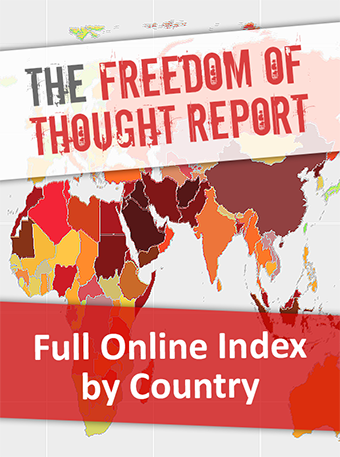Statement of Humanist Association of Finland and The Union of Freethinkers of Finland
To the UN Human Rights Council
As Finnish non-governmental organisations, we promote all human rights, whilst our activities focus on freedom of religion, opinion and conscience, freedom of speech and equal, non-discriminatory treatment of people, regardless of their religion or belief. We are members of the Humanists International and European Humanist Federation organisations.
Our efforts to end systemic discrimination based on religion and belief have not borne fruit, so we hope to obtain support from the UN Human Rights Council. The Evangelical Lutheran Church of Finland and the Orthodox Church of Finland have privileged special status under public law in relation to the State, which reflects the systemic, structural discrimination exercised by the public authorities against non-believers and practitioners of other religions.
According to Article 76 of the Constitution, Parliament may approve amendments to the Church Act only by proposal of the Church Assembly of the Evangelical Lutheran Church. The dues pertaining to the churches mentioned are collected via ecclesiastical taxation by the Tax Authority of the Public Authorities and, if necessary, via recovery proceedings. The bishops and clergy of these State churches are civil servants.
The joining of children born within a religious community is recorded in the population register, which gives rise to the obligation to participate in religious instruction in primary and secondary school as well as church tax liability. Resignation from the churches is permitted only after reaching the age of 18.
Although according to the Early Childhood Education Act, the Basic Education Act and the Upper Secondary Schools Act, education does not include religious education or the practice of religion, and though the basics of early childhood education and curriculum explicitly state that education must be “independent with regard to religion, outlook and party politics,” the practical circumstances are different. Notwithstanding these regulations, day-to-day worship and devotional moments are included in the programme during the operational period of daycare centres and the academic year of schools. This inclusion is regarded in itself as discriminatory, even if participation in religious occasions is not compulsory. In addition, decent non-religious programme events are rarely arranged as an alternative to these occasions.
We do not deny the right to positive freedom of religion provided by Article 11 of the Constitution, but the programme of daycare centres and schools should not be accompanied by confessional and binding events. Providing them violates the privacy of sensitive information by forcing families to reveal their religiosity or non-religiosity through their children. Religious occasions can be offered outside the school hours.
Religious communities have the right to perform marriage ceremonies and should not be required to separately seal marital vows at a register office. Despite requests, secular non-governmental organizations have nevertheless not been given the right to perform marriages.
General funeral services are regulated for performance by the congregations of the Evangelical Lutheran Church, and for this purpose they receive financial aid from the State. However, not all congregations relinquish their chapels for funeral events related to non-religious interests or to other faiths. Burial grounds maintained by others such as freethinkers do not receive State aid. Funeral services should be transferred to the responsibility of the public authority.
In the defence forces and in prisons, spiritual support from those who are not clergy members should be increased alongside the spiritual support provided by ministers of religion.
The duties of ministers of public officials are not religious in character, so solemn declaration through honour and conscience should suffice as commitment to them. The same applies to the defence forces: a religious oath is no longer mandated by modern times.
If church services are still associated with the opening and closing ceremonies of Parliament, a non-affiliated occasion should have the same status.
Citizens have the constitutional right to be treated equitably. At present, the special public status of the Evangelical Lutheran and Orthodox Churches makes the non-religious and members of other religious communities second-class citizens.
Secularisation in Finland has continued, with the effect that the proportion of members of the Evangelical Church has fallen to 66.5 per cent, the proportion of infant baptisms has fallen below this, more civil marriages are performed than church ordinations, the total number of secular child-naming ceremonies is increasing, and the funeral culture is diversifying, even if discrimination in funeral practices occurs.
Those who belong to the Church may also be quite secular in their ideas and may not believe in church doctrine. This emerges from the general enquiry organised by the Church Institute for Research and Advanced Training (2019).
As non-governmental organizations, we have proposed that the special status of the Finnish Evangelical Lutheran Church and the Finnish Orthodox Church in relation to the Finnish state should be eliminated. Citizens must begin to be treated equally, regardless of religion or belief, with respect for freedom of religion, perspective and conscience. This requires legislative amendments.
The criminalisation of blasphemy should be abolished
Blasphemy as part of criminal law is irrelevant to modern times, as it curtails freedom of speech. Finland has already received multiple complaints on the matter from the UN Commission on Human Rights. Many skilled in jurisprudence in Finland also consider that the legal paragraph concerned could be withdrawn.
Since hate speech, incitement towards ethnic groups and the violation of public peace are prohibited in Finland, this also provides protection for religious and non-religious people and communities alike.
While blasphemy is included in the criminal code in Finland, the nation cannot fully intervene in religious-based human rights violations in international institutions. The interpretation of blasphemy laws in various countries is highly arbitrary.
Respectfully,
Chairperson
Irma Peiponen & Jape Lovén
Humanist Association of Finland & The Union of Freethinkers of Finland
